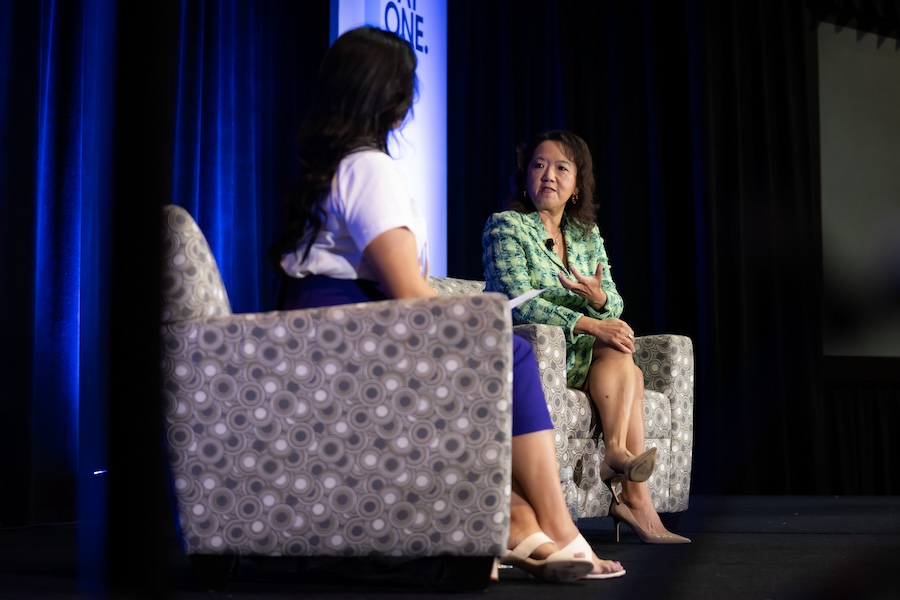How to Harness Inclusive Leadership to Elevate Your Workforce and Workplace


Anne Chow was put in charge of a team of several hundred people when she started her leadership career at AT&T. She was in her mid-20s, while most of her team members were more than twice her age.
“I was being called names behind my back and to my face,” Chow said during a fireside chat at From Day One’s Austin conference. But that harsh experience helped Chow realize leadership was about making the right choices for your team. She had to choose between either focusing on the noise or bringing out the best in the people she was responsible for. Chow chose the latter, and the experience helped cement a core belief that defined her 32-year career at the telecom giant, culminating in her role as the CEO of AT&T Business: leadership is all about people.
“It’s that old adage where you manage things, but you lead people,” Chow said to moderator Leslie Rangel, the deputy managing editor at The Barbed Wire. “That is ultimately what leadership is about,” she said. Chow shared lessons from the experience recorded in her book, Lead Bigger: The Transformative Power of Inclusion, outlining a framework that managers can use to develop inclusive leadership styles required for today’s complex, multi-generational workforce.
From Feeling Excluded to Championing Inclusion
Chow’s passion for inclusive leadership is deeply personal. She often felt she didn’t fit in early in her career as a second-generation American. Her career choice as a technology leader usually meant she was often the first or only woman or ethnic minority in the room.
“I never really perfectly fit into any category or any box,” Chow said. That awareness fueled her desire to ensure members of her team always felt like they belonged. She chose to focus on connecting with people individually, meeting them where they were, and finding common ground.

Chow’s inspiration for the book was to create a guide for managers on inclusive leadership, which she views as a non-negotiable core competency for modern leaders. “I absolutely, in every cell of my body, believe that if you do not learn how to choose to lead inclusively, you’re going to lose to somebody who does,” Chow said.
Widening the Aperture on Inclusion
Chow reframes the concept of inclusion with a simpler, action-oriented definition: “Widening your perspective to have greater performance and impact.” Leaders can actively widen their perspectives by doing three key things:
Chow says this approach is essential in a world that’s more interconnected and polarized. She offers a fresh perspective on the increasingly contentious topic of DEI. For Chow, diversity is the “reality” of the modern world, equity means fairness based on what an organization actively defines it to be, and inclusion is the “action” required to deliver exceptional performance.
“Inclusion is the ultimate tool for meritocracy,” Chow said. “Hasn’t it been about making sure that we are tapping into talent pools, wherever they are, whatever they look like? Talent doesn’t necessarily look like an Ivy League degree. Ironically, inclusion is necessary if you want to field the best teams today and tomorrow.”
Three Foundational Beliefs for Modern Leaders
Chow emphasizes the importance of self-care and finding allies for HR professionals and managers. “You are carrying a heavy load,” she added, noting that the responsibility of building an organization’s culture cannot rest on the shoulders of HR alone; it must be shared by leaders all over the business.
Chow closed the session by sharing three beliefs that form the foundation of her leadership philosophy. First, that every business is a people business. “It is people that drive the business.” She points out the need to rebuild trust after layoffs as a prime example of this truth, stating that unaddressed fear and doubt prevent an organization from moving forward.
Second, leadership is a choice that transcends: “Leadership has no gender, no color, no title, no position, no race, no religion, no politics, no age, no language,” she said. She defines leadership as the ability to align, motivate, and inspire a group of people toward common goals. She encourages companies to view their entire talent pool as potential leaders, not just those at the top of the organization’s hierarchy.
And third, culture is your ultimate competitive advantage: Chow believes the best products and strategies can be easily copied in an age of constant disruptions, but the same can’t be said about a company’s culture. She defines culture as the behavioral norms reflected in an organization’s policies and practices, and more importantly, the actions of its leaders.
For Chow, leadership became the art of creating a sense of connecting to others, inspired by the experiences of a young worker who once felt she didn’t belong. Building a more successful organization and a more fulfilling career starts with intentionally widening your perspective so you can recognize, value, and unleash the potential in everyone around you.
Ade Akin covers workplace wellness, HR trends, and digital health solutions.
(Photos by Josh Larson for From Day One)
The From Day One Newsletter is a monthly roundup of articles, features, and editorials on innovative ways for companies to forge stronger relationships with their employees, customers, and communities.